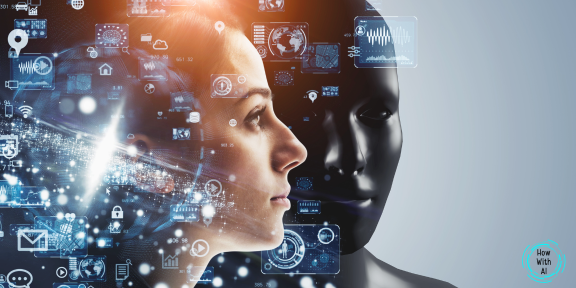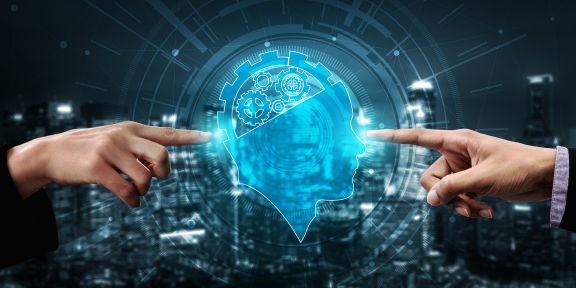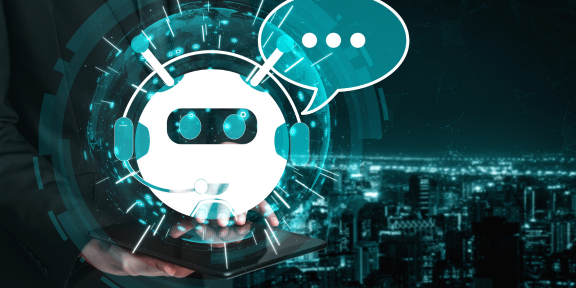The Rise of the Artificial Intelligence Agency: Revolutionizing Business Automation

As technology continues to evolve at an unprecedented rate, businesses are constantly seeking ways to leverage these advancements to streamline their operations and gain a competitive edge. One such innovation that has garnered significant attention is Artificial Intelligence (AI). AI has proven to be a game-changer in various industries, revolutionizing the way businesses operate and interact with their customers. In this article, we will explore how the AI revolution has created the emergence of Artificial Intelligence Agencies and delve into how they are reshaping the landscape of business automation.
Understanding the Artificial Intelligence Agency
An Artificial Intelligence Agency, also known as an AI Agency, is a business model that harnesses the power of AI services to assist other companies in implementing automation and intelligence systems into their processes and workflows. These agencies collaborate with businesses to develop and deploy AI-based solutions that enhance efficiency, productivity, and profitability. The scope of AI automation agencies is vast, with countless industries and organizations benefiting from their services.
AI automation agencies offer a wide range of services to their clients, leveraging AI technologies to automate various aspects of their operations. From chatbots and content generation systems to personalized customer outreach and customized plan generators, these agencies provide tailored solutions to meet the unique needs of each business. By implementing AI-driven automation, businesses can optimize their workflows, reduce costs, and focus on strategic initiatives that drive growth.
How can AI help transform businesses?
AI technology can optimize business processes, increase efficiency, and improve business performance by optimizing analytics and predictive analytics. Many business uses are currently using AI.

Differentiating Automation and Intelligent Systems
Before diving deeper into the realm of AI automation agencies, it is crucial to understand the distinction between automation and intelligent systems. Automation involves the use of machines and software to perform repetitive and rule-based tasks without human intervention. It aims to streamline processes, eliminate errors, and improve efficiency. On the other hand, intelligent systems, powered by AI, go beyond automation by incorporating cognitive capabilities such as learning, reasoning, and decision-making. These systems can analyze data, adapt to changing circumstances, and continuously improve their performance.
While automation focuses on optimizing specific tasks, intelligent systems bring a higher level of sophistication by mimicking human intelligence and decision-making. By combining the power and speed of automation and intelligent systems, AI automation companies offer businesses a comprehensive approach to process optimization and digital transformation.
How are agencies leveraging AI and machine learning?
AI marketers are using the techniques to gain valuable insight about the customer and use them to create personalized campaigns. They also use AI automated capabilities for automating repetitive activities and optimising workflows. AI also helps these companies conduct predictive analytics to predict future outcomes and customer needs.
How Marketing Agencies Are Using AI
As a marketing tool, AI is still relatively new, and some marketing firms have been quick to adopt AI, this disruptive tech. The survey shows that the average American marketing agency is already using AI. In addition a number of companies have been using AI technology to analyze content to determine whether it is harmful. Some even argue that artificial intelligence research is becoming necessary to moderate content because digital technologies have become more prevalent in recent years.

The Automation Pyramid: A Framework for AI Implementation
To effectively implement AI services, businesses can utilize methods of the Automation Pyramid, a framework that outlines the different stages of automation. The Automation Pyramid consists of four levels, each representing a distinct level of complexity and integration:
- Device Level Automation: This level focuses on automating individual devices or machines, such as sensors, actuators, and controllers. It involves basic control and monitoring functions to optimize device performance.
- Control Level Automation: At this level, automation extends beyond individual devices to encompass control systems. It involves integrating multiple devices and sensors to enable centralized control and monitoring.
- Information Level Automation: Information level automation focuses on aggregating and analyzing data from multiple control systems. It aims to derive insights and optimize processes based on the collected information.
- Enterprise Level Automation: The highest level of the Automation Pyramid, enterprise level automation, involves integrating information from various sources across the organization. It enables end-to-end automation and optimization of business processes.
By understanding the Automation Pyramid, AI automation agencies can guide businesses through each level, helping them implement AI technologies that align with their specific needs and goals.

The Nine Pillars of Automation
Within the realm of AI automation agencies, there are nine key pillars that serve as the foundation for successful automation implementation. These pillars encompass various aspects of the automation journey and provide a holistic framework for businesses to navigate their automation initiatives. Let’s explore each pillar in detail:
- Strategy and Planning: This pillar focuses on defining the organization’s automation goals, identifying suitable processes for automation, and developing a comprehensive strategy to drive successful implementation.
- Process Identification and Assessment: The second pillar involves identifying manual and repetitive processes suitable for automation and conducting a thorough assessment to determine their feasibility and potential benefits.
- Technology Selection and Integration: Businesses must select the right AI technologies and tools that align with their automation objectives. This pillar emphasizes the integration of these technologies into existing systems and workflows seamlessly.
- Data Management and Governance: Effective automation relies on accurate and reliable data. This pillar emphasizes the importance of data management practices, including data quality, security, privacy, and compliance.
- Change Management and Culture: Successful automation requires a supportive organizational culture and effective change management practices. This pillar focuses on fostering a culture of innovation, training employees, and managing the transition to automated processes.
- Governance and Control: Automation should be governed by robust policies and controls to ensure compliance, risk mitigation, and accountability. This pillar emphasizes the need for clear guidelines and oversight throughout the automation journey.
- Performance Measurement and Optimization: Measuring the performance and impact of automation is crucial for continuous improvement. This pillar emphasizes the use of key performance indicators (KPIs) and analytics to monitor and optimize automated processes.
- Skills Development and Workforce Planning: Automation necessitates reskilling and upskilling the workforce to adapt to changing roles and responsibilities. This pillar focuses on developing the skills and competencies required for an automated environment.
- Continuous Innovation and Exploration: Automation is an ongoing journey, and businesses must continuously explore new technologies and innovations to stay ahead. This pillar encourages businesses to embrace a culture of continuous learning and innovation.
By following these nine pillars, businesses can embark on a structured and successful automation journey, leveraging the expertise of AI automation agencies to navigate the complexities of implementation.

The Benefits of AI Automation Agencies
The emergence of AI automation agencies offers numerous benefits to businesses seeking to leverage AI technologies for automation. Let’s explore some of the key advantages these agencies bring to the table:
- Expertise and Guidance: AI automation agencies possess deep knowledge and expertise in AI technologies and automation strategies. They can guide businesses through the entire process, from identifying suitable automation opportunities to implementing and optimizing AI-driven solutions.
- Cost Savings and Efficiency: By automating repetitive and time-consuming tasks, businesses can achieve significant cost savings and improve operational efficiency. AI automation agencies help identify areas where automation can deliver the greatest impact, maximizing cost savings and resource allocation.
- Enhanced Productivity and Scalability: AI automation enables businesses to streamline their workflows, allowing employees to focus on more strategic and value-added activities. With the support of AI automation agencies, businesses can scale their operations efficiently, handling increased volumes without compromising quality.
- Improved Customer Experience: AI technologies, such as chatbots and personalized outreach systems, can enhance the customer experience by providing quick and accurate responses to inquiries. AI automation agencies help businesses leverage these technologies to deliver personalized and efficient customer interactions.
- Data-Driven Decision Making: AI automation agencies assist businesses in harnessing the power of data to make informed decisions. By leveraging AI algorithms and analytics, businesses can gain valuable insights from their data, enabling them to make data-driven decisions and drive business growth.
- Competitive Advantage: Implementing AI automation can provide businesses with a competitive advantage in their respective industries. By staying ahead of the curve and leveraging innovative AI technologies, businesses can differentiate themselves from their competitors and capture new opportunities.

Looking Ahead: The Future of AI Automation Agencies
The future of AI automation agencies is incredibly promising, as the adoption of AI technologies continues to grow across industries. As businesses recognize the tremendous value and potential of AI-driven automation, the demand for AI automation agencies will undoubtedly increase.
With advancements in AI and machine learning, AI automation agencies will continue to push and test the boundaries of what is possible. The integration of generative AI tools, such as ChatGPT and Google’s Bard, will open up new avenues for creativity and innovation in marketing and customer engagement. Artificial intelligence services companies will play a vital role in helping businesses leverage these tools to create personalized and engaging experiences for their customers.
Additionally, as automation becomes more accessible and affordable, small and midsize agencies can seize the opportunity to offer AI automation services to a broader range of clients. The barriers to entry are lowering, enabling agencies of all sizes to harness the power of AI and deliver tangible business outcomes.
Wrap Up
AI automation agencies are revolutionizing the way businesses operate, providing them with the tools and expertise to unlock the full potential of AI-driven automation. By collaborating with AI automation agencies, businesses can embrace the power of AI, optimize their processes, and drive sustainable growth in an increasingly competitive landscape. The future is bright for AI automation agencies, as they continue to shape the future of business automation and digital transformation.

Guide to Working With an Artificial Intelligence Agency
Artificial Intelligence (AI) has revolutionized numerous industries and has become an integral part of businesses worldwide. To harness the power of AI effectively, many companies are turning to AI agencies for specialized expertise and guidance. In this article, we will explore the concept of an artificial intelligence agency and delve into how businesses can leverage the services provided by these agencies.
1. What is an AI Agency?
An artificial intelligence agency is a specialized organization or company that offers AI-based solutions and services to businesses. These agencies employ a team of AI experts who possess advanced knowledge and skills in areas such as machine learning, natural language processing, computer vision, and data analysis. By partnering with an artificial intelligence agency, businesses can access cutting-edge AI technologies without having to develop their own in-house capabilities.
2. How Does an AI Agency Help Businesses?
AI agencies provide a wide range of services tailored to suit businesses’ specific needs. These services include:
- AI Consulting: AI agencies offer advisory services to help businesses identify areas where AI can be implemented effectively. They assess the business’s unique requirements and goals, providing guidance on which AI technologies to adopt and how to integrate them seamlessly into existing systems.
- AI Development: AI agencies develop customized AI solutions and applications based on the business’s requirements. They utilize advanced algorithms and methodologies to create AI models that can automate tasks, generate insights, optimize processes, and enhance decision-making.
- Data Analysis: As data is the fuel that powers AI, agencies assist businesses in collecting, cleaning, and analyzing large datasets. They employ techniques such as data mining, pattern recognition, and predictive modeling to extract valuable insights from the data, which can be leveraged to drive strategic business decisions.
- Machine Learning: AI agencies leverage machine learning algorithms to train AI models on vast amounts of data. These models can then make accurate predictions, recognize patterns, and adapt to changing conditions. Businesses can benefit from machine learning in various ways, including personalized marketing, fraud detection, and recommendation systems.
- Natural Language Processing: Many businesses require AI systems that can understand and process human language. AI agencies specialize in developing natural language processing (NLP) solutions, enabling businesses to automate tasks like chatbots, voice assistants, and sentiment analysis.
- Computer Vision: Computer vision is another crucial component of AI, enabling machines to understand and interpret visual information. AI agencies develop computer vision systems that can detect objects, recognize faces, and analyze images and videos. This technology has applications in industries such as healthcare, manufacturing, and retail.

3. Why is Partnering with an AI Agency Beneficial?
By partnering with an artificial intelligence services companies, businesses can unlock several benefits:
- Access to Expertise: AI agencies possess deep knowledge and experience in the field, allowing businesses to tap into cutting-edge AI technologies and advancements. They stay up to date with the latest trends, ensuring that businesses benefit from the most innovative solutions.
- Cost-Effectiveness: Building an in-house AI team can be expensive and time-consuming. By collaborating with an artificial intelligence agency, businesses can save on recruitment and training costs while gaining access to a team of AI experts.
- Faster Implementation: AI agencies have the necessary infrastructure and resources to implement AI solutions rapidly. They can develop and deploy AI systems in a shorter time frame, enabling businesses to realize the benefits of AI sooner.
- Scalability: As businesses grow, their AI requirements may change. AI agencies provide scalable solutions that can adapt to a company’s evolving needs, ensuring that AI systems can accommodate increasing data volumes and user demands.
- Focus on Core Competencies: Partnering with an AI agency allows businesses to focus on their core competencies while leaving the AI development to the experts. This enables companies to concentrate on driving growth and innovation in their respective industries.

4. How to Choose the Right AI Agency for Your Business?
Selecting the right AI agency is crucial for maximizing the benefits of AI implementation. Here are some factors to consider when choosing an artificial intelligence agency:
- Expertise: Evaluate the agency’s expertise and track record in AI development. Look for agencies with experience in your industry and the specific AI technologies you require.
- Client Portfolio: Assess the agency’s client portfolio to determine the range and quality of their past work. Consider seeking references or testimonials from previous clients to gain insights into the agency’s capabilities.
- Collaboration and Support: Effective collaboration and communication are essential for a successful partnership. Choose an agency that values collaboration, actively involves your team, and provides ongoing support throughout the AI development process.
- Data Security and Privacy: Ensure that the agency has robust data security measures in place. As AI often requires the utilization of sensitive business data, it is vital to select an agency that prioritizes privacy and adheres to strict data protection guidelines.
- Cost and ROI: Consider the agency’s pricing structure and assess the potential return on investment (ROI) from their services. A reliable agency will provide transparent pricing and demonstrate how their AI solutions can deliver tangible value to your business.
5. Can Small Businesses Benefit from an AI Agency?
Absolutely! While AI agencies typically work with large enterprises, small businesses can also benefit from their services. By outsourcing AI services to an agency, small businesses can access the expertise and resources needed to implement AI solutions, even with limited budgets. AI can help small businesses automate processes, improve customer experiences, and gain a competitive edge in their industry.
Conclusion
AI agencies play a crucial role in bridging the gap between businesses and AI technologies. These specialized organizations provide expertise, guidance, and customized solutions to help businesses leverage the power of AI effectively. By partnering with an AI agency, companies can navigate the complex AI landscape with confidence, accelerating their digital transformation and driving growth in today’s fast-paced business environment. So, whether you are a large enterprise or a small business, consider harnessing the potential of AI agencies to stay ahead of the competition and unlock new opportunities for success.

Frequently Asked Questions (FAQ)
1. What are the services offered by AI agencies?
AI agencies offer services such as AI consulting, AI development, data analysis, machine learning, natural language processing, and computer vision.
2. How can partnering with an AI agency benefit my business?
Partnering with an AI agency provides access to expertise, cost-effectiveness, faster implementation, scalability, and allows businesses to focus on core competencies.
3. How can I choose the right AI agency for my business?
Consider factors such as expertise, client portfolio, collaboration model training and support, data security and privacy, and cost and ROI when selecting an AI agency for your business.
4. Can small businesses benefit from an AI agency?
Yes, small businesses can benefit from AI agencies by using market research and accessing necessary expertise and resources to implement AI solutions, even with limited budgets.
5. What are the advantages of AI for small businesses?
AI platforms can help small businesses automate processes, improve customer experiences, and gain a competitive edge in their industry.
6. Can AI agencies help with specific industry requirements?
Yes, AI agencies often have experience in specific industries and can develop customized AI solutions tailored to meet industry-specific requirements.
7. How can AI agencies ensure data security and privacy?
Reputable AI agencies prioritize data security and privacy by implementing robust measures to protect sensitive business data and adhering to strict data protection guidelines.
